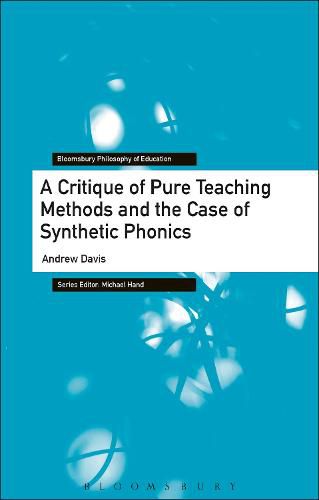Readings Newsletter
Become a Readings Member to make your shopping experience even easier.
Sign in or sign up for free!
You’re not far away from qualifying for FREE standard shipping within Australia
You’ve qualified for FREE standard shipping within Australia
The cart is loading…






A Critique of Pure Teaching Methods and the Case of Synthetic Phonics examines how research into the effectiveness of teaching methods can and should relate to what takes place in the classroom. The discussion brings to light some important features of the way we classify teaching activities. The classifications are unlike those we use in natural science - for instance, how we classify drug dosages. This point has very important implications for what should be considered the appropriate relationships between educational research and classroom practice.
Andrew Davis applies the results of this discussion to the teaching of early reading, focussing in particular on the approach known as synthetic phonics. He provides a philosophical investigation into the nature of reading, and into the concepts that feature in approaches to teaching it, such as the idea of building words from letter sounds, the nature of words themselves and reading for meaning. He concludes with a discussion of why this matters so much, reflecting on how stories and books can be part of a child’s emerging identity within the family. He explores how values of family life should be weighed against the importance of achievements in school, and argues for the claim that school reading policies of certain kinds may have a destructive impact if they are felt to trump the private interests of children and their families.
$9.00 standard shipping within Australia
FREE standard shipping within Australia for orders over $100.00
Express & International shipping calculated at checkout
A Critique of Pure Teaching Methods and the Case of Synthetic Phonics examines how research into the effectiveness of teaching methods can and should relate to what takes place in the classroom. The discussion brings to light some important features of the way we classify teaching activities. The classifications are unlike those we use in natural science - for instance, how we classify drug dosages. This point has very important implications for what should be considered the appropriate relationships between educational research and classroom practice.
Andrew Davis applies the results of this discussion to the teaching of early reading, focussing in particular on the approach known as synthetic phonics. He provides a philosophical investigation into the nature of reading, and into the concepts that feature in approaches to teaching it, such as the idea of building words from letter sounds, the nature of words themselves and reading for meaning. He concludes with a discussion of why this matters so much, reflecting on how stories and books can be part of a child’s emerging identity within the family. He explores how values of family life should be weighed against the importance of achievements in school, and argues for the claim that school reading policies of certain kinds may have a destructive impact if they are felt to trump the private interests of children and their families.